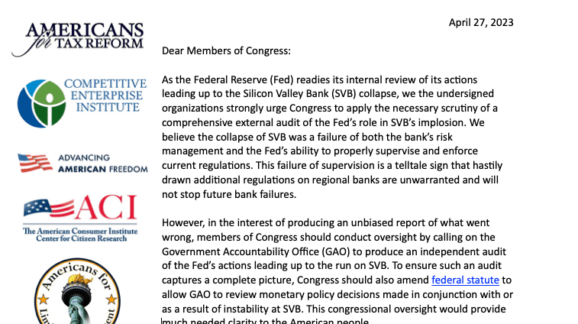CEI Co-Leads Coalition Letter Calling For External Audit of Fed on Bank Failures
As the Federal Reserve (Fed) readies its internal review of its actions leading up to the Silicon Valley Bank (SVB) collapse, we the undersigned organizations strongly urge Congress to apply the necessary scrutiny of a comprehensive external audit of the Fed’s role in SVB’s implosion. We believe the collapse of SVB was a failure of both the bank’s risk management and the Fed’s ability to properly supervise and enforce current regulations. This failure of supervision is a telltale sign that hastily drawn additional regulations on regional banks are unwarranted and will not stop future bank failures.
However, in the interest of producing an unbiased report of what went wrong, members of Congress should conduct oversight by calling on the Government Accountability Office (GAO) to produce an independent audit of the Fed’s actions leading up to the run on SVB. To ensure such an audit captures a complete picture, Congress should also amend federal statute to allow GAO to review monetary policy decisions made in conjunction with or as a result of instability at SVB. This congressional oversight would provide much needed clarity to the American people.
On March 13, the Fed announced that Vice Chair for Supervision Michael Barr would publish a review of SVB’s supervision and regulation by May 1. A review is necessary to understand how SVB’s significant interest rate and liquidity risks persisted without redress. However, the Fed’s review of its own actions leading up to SVB’s demise is a perfect example of a fox guarding the hen house. This clear conflict of interest calls into question the Fed’s legitimacy as the reviewer of its own transparency and accountability. The Fed could potentially whitewash information that shields itself from evidence of negligence or wrongdoing.
We thank lawmakers who have already called out the Fed for being asleep at the wheel and who want more answers concerning the Fed’s accountability. Next, however, Congress should ask GAO to audit the Fed’s actions. Legislation allowing the GAO to audit monetary policy decisions potentially related to SVB’s failure should be attached to an immediate omnibus legislative vehicle. This would shed light on how the Fed’s monetary policy decisions, which impact the whole of the economy, are influenced by fluctuations in specific sectors of the economy.
According to The Wall Street Journal, the Fed was aware of SVB’s risk management issues before its collapse. The Fed issued warnings to SVB about its liquidity constraints because it was inaccurately modeling the duration of its bond investments. SVB was already required under existing rules to have a risk committee and a chief risk officer to report and resolve any “risk-management deficiencies in a timely manner.” Last year SVB neglected to fill the chief risk officer position for eight months. It is hard to believe the Fed was unaware that the role was unfilled for a significant amount of time. A GAO audit can identify key factors that contributed to the Fed’s supervisory failures.
These supervisory failures are likely only a fraction of the total amount of the Fed’s inadequacy. For the sake of transparency and to preclude conflicts of interest, members of Congress should ask the GAO to audit the Fed’s actions leading up to the run on SVB. Congress should also pass legislation to allow the GAO to audit the Fed’s monetary policy decisions to better understand how Fed actions might have influenced SVB’s interest rate risk and risk management practices. These actions are necessary so the American people can better understand how the federal government – and particularly the Federal Reserve – failed to do its job.
Sincerely,
Grover Norquist
President
Americans for Tax Reform
John Berlau
Director of Finance Policy
Competitive Enterprise Institute
Paul Teller
Executive Director
Advancing American Freedom
Steve Pociask
President / CEO
American Consumer Institute
Robert Romano
Vice President of Public Policy
Americans for Limited Government
Jeffrey Mazzella
President
Center for Individual Freedom
Gerard Scimeca
Chairman
Consumer Action for a Strong Economy
Yaël Ossowski
Deputy Director
Consumer Choice Center
George Landrith
President
Frontiers of Freedom
James Taylor
President
The Heartland Institute
Cameron Sholty
Executive Director
Heartland Impact
Heather R. Higgins
CEO
Independent Women’s Voice
Seton Motley
President
Less Government
Charles Sauer
President
The Market Institute
Scott Shepard
Director, Free Enterprise Project
National Center for Public Policy Research
David Williams
President
Taxpayers Protection Alliance
Saulius “Saul” Anuzis
President
60 Plus Association
James L. Martin
Founder/Chairman
60 Plus Association
